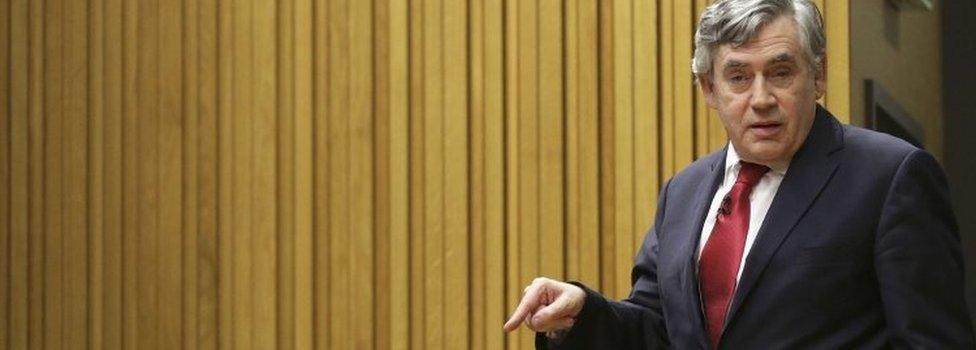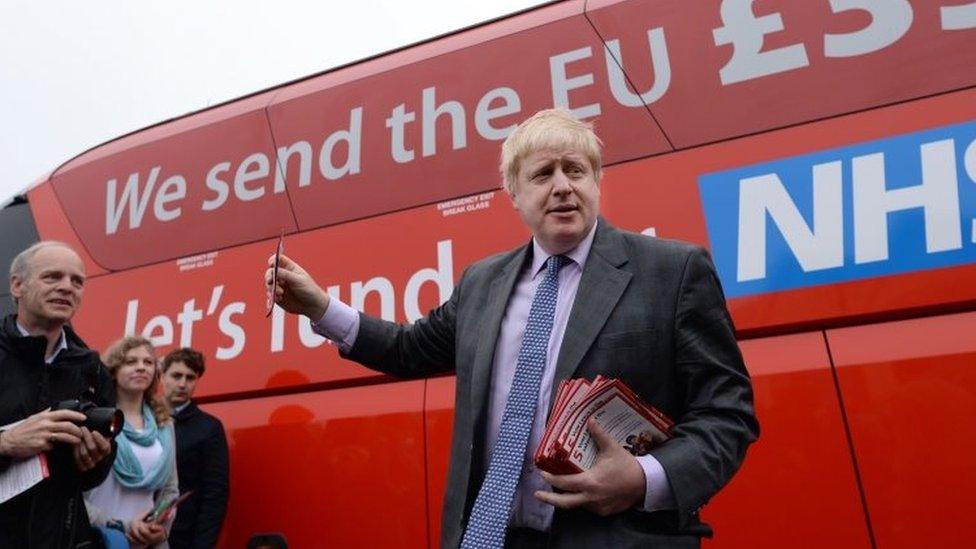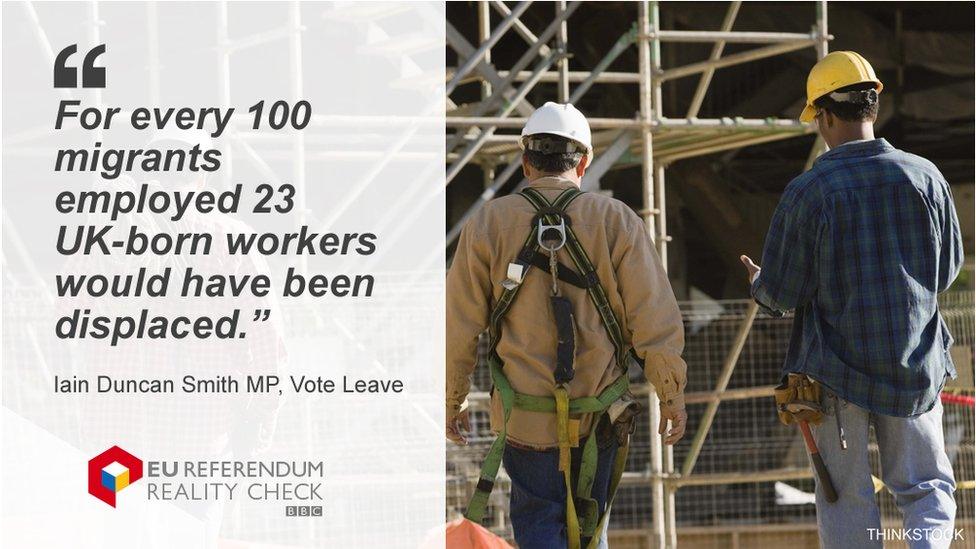Gordon Brown says quitting EU would not be British
- Published
Gordon Brown tells the BBC's Laura Kuenssberg that he believes Labour voters will back Europe
Gordon Brown has thrown his weight behind the campaign to stay in the EU, claiming it is "not British to retreat to Europe's sidelines".
The former prime minister argued that Britain needed to be in the EU to shape the continent's responses to terrorism, immigration and climate change.
And it was "not in tune with the Churchillian spirit" to "disengage".
Leave campaigners said Mr Brown's arguments "rang hollow" given his "disastrous record" while in office.
The British public will decide in a referendum on 23 June whether to remain in the EU or to leave.
With just over six weeks until the vote, campaigning has been stepped up by both sides. In other EU referendum developments on Wednesday:
George Osborne says contingency planning is taking place to anticipate the impact on financial stability of a vote to leave the EU.
Boris Johnson launches a UK-wide Vote Leave campaign in Cornwall, brandishing a pasty as he boards its battle bus
Lib Dem leader Tim Farron says the EU is not a "monster directed against Britain" but a group of friendly democratic governments
Details of donations and loans raised by the Leave and Remain campaigns are published
Sky News and ITV announce plans for referendum coverage
In a wide-ranging speech at the London School of Economics, Mr Brown invoked Britain's history of standing up for human rights and fighting fascism and anti-Semitism.
He said the EU referendum should be an opportunity to make the positive case for Europe and the UK's "outward looking internationalism" and said Labour voters were more likely to respond to positive arguments for staying in.
The Remain campaign, he added, would have to secure the backing of Labour, Lib Dem and SNP voters if they were going to win - and the campaign should stress the benefits to ordinary people of EU membership over pay, working conditions and employment rights.
'Leader in Europe'
He echoed Prime Minister David Cameron's comments about the EU's role in preserving peace and stability.
"For 1,000 years nations and tribes of Europe were fighting to the finish and murdering and maiming each other. There is no century except this one where Europe has been at peace and nations... were not vying for supremacy," he said
But for the last 70 years since World War Two, nations now "battle with arguments and ideas" and not "with weapons and armaments".
"It is like we have not just exchanged swords for ploughshares, we have made it possible so that people never think that swords will be used again."

Analysis

By BBC Political Editor Laura Kuenssberg
There are two silent concerns inside strands of the Labour Remain camp.
First that the focus on the economic message, Project Fear as it's nicknamed, isn't enough.
And second, Labour voters who might be a bit fed up with the EU but are reluctantly supportive might not turn out to vote.
During the Scottish independence referendum Mr Brown's last minute fiery political sermons were a shot in the arm for the Unionists.
He is intervening now (as ever) on his own terms, but the former prime minister's interventions this time might have some effect.

In the first of a series of planned speeches in the run-up to polling day, the former Labour leader said: "If this referendum is about anything it is about what kind of Britain we are and what kind of Britain we aspire to become.
"We should be a leader in Europe, not simply a member. We should not be fully out and we should not be half out. We should be fully in.
"We should recognise that the world has changed since the first referendum and we should be advocates for cooperation in an inter-dependent world."

Boris Johnson headed to the West Country in his Vote Leave battle bus
In a question and answer session afterwards, Mr Brown said the EU was moving to a "more flexible" model, adding: "The future lies in a united Europe of states rather than a United States of Europe.
"Too much cooperation and people will feel their identity is at risk, too little cooperation and it will not be possible to solve the economic, social and environmental problems we face."
Ahead of his speech, Mr Brown used articles in the Mirror and the Guardian to argue that Britain must be at the heart of European policy making.
Mr Brown, who has been credited with stopping Britain joining the euro when he was chancellor in the 1990s, told the Mirror, external the British must stop being "reluctant Europeans" and shape the continent's responses to terrorism, immigration and climate change.
'Passion and commitment'
"I think most people would agree that it's not British or in tune with the Churchillian spirit to simply disengage when Ukraine is in turmoil. It is not British to retreat to Europe's sidelines when there is a common fight against illegal immigration and terrorism," he wrote.
"It is certainly not British... to allow ourselves to be on the periphery when important defence and security decisions are made, not only in Nato but in the European Union."
In a separate article for the Guardian, external, Mr Brown urges the EU to use its clout to take concerted action against tax havens.
In response, a Vote Leave spokesman said: "Gordon Brown was in a government that gave away part of our rebate and opened our borders across the EU. Lessons on the patriotic case for the EU will ring hollow from a prime minister with such a disastrous record in Europe."
Boris Johnson kick-started a UK-wide bus tour in Cornwall, a part of the country that has historically been eurosceptic.
Mr Johnson said of his Remain opponents: "They think they have got the big battalions because they have the taxpayers' money.
"We have got the passion, we have got the commitment.
"Let's make June 24 independence day for Britain," he cried, waving a pasty handed to him by a well-wisher.
- Published18 April 2016

- Published10 May 2016

- Published10 May 2016